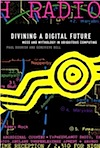Paul Dourish and Genevieve Bell on ubicomp mythology
Paul Dourish and Genevieve Bell
MIT Press, April 2011, 264 pages
ISBN 978-0-262-01555-4
264 pages
Amazon page | MIT Press page
Ubiquitous computing (or “ubicomp”) is the label for a “third wave” of computing technologies. Following the eras of the mainframe computer and the desktop PC, ubicomp is characterized by small and powerful computing devices that are worn, carried, or embedded in the world around us. The ubicomp research agenda originated at Xerox PARC in the late 1980s; these days, some form of that vision is a reality for the millions of users of Internet-enabled phones, GPS devices, wireless networks, and “smart” domestic appliances.
In Divining a Digital Future, computer scientist Paul Dourish and cultural anthropologist Genevieve Bell explore the vision that has driven the ubiquitous computing research program and the contemporary practices that have emerged–both the motivating mythology and the everyday messiness of lived experience.
Reflecting the interdisciplinary nature of the authors’ collaboration, the book takes seriously the need to understand ubicomp not only technically but also culturally, socially, politically, and economically. Dourish and Bell map the terrain of contemporary ubiquitous computing, in the research community and in daily life; explore dominant narratives in ubiquitous computing around such topics as infrastructure, mobility, privacy, and domesticity; and suggest directions for future investigation, particularly with respect to methodology and conceptual foundations.
Paul Dourish is Professor of Informatics at the University of California, Irvine, with courtesy appointments in Computer Science and in Anthropology. He conducts research in human-computer interaction, ubiquitous computing, and social studies of science and technology. Before joining UC Irvine, he was a Senior Member of Research Staff at Xerox PARC.
Genevieve Bell is an Intel Fellow and the Director of Intel’s first user-focused research and development lab, Interaction and Experience Research. A cultural anthropologist, she studies the relationship between information technology and cultural practice both in technology design and in settings of everyday use. Before joining Intel, she taught Anthropology and American Studies at Stanford University.




